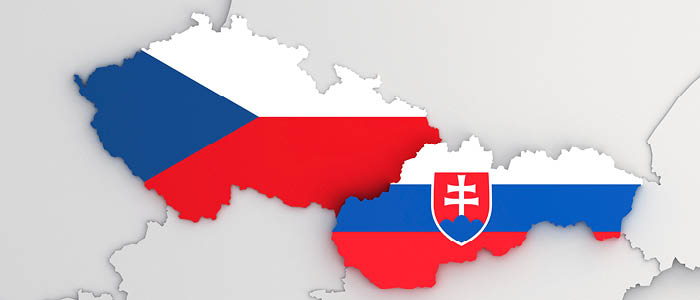The relationship between the Czech Republic and Slovakia is forged on a shared history and close economic ties. As the two countries maintain strong trade relations and extensive cross-border business activities, legal firms have recognized the need to establish a presence in both jurisdictions. Havel & Partners Managing Partner Jaroslav Havel, BPV Braun Partners Managing Partner Arthur Braun, and Eversheds Sutherland Managing Partner Bernhard Hager talk about the ties that bind the two legal landscapes.
Bratislava – A Strategic Location
“When we decided to go to Bratislava in 2009, we had already operated a Slovak desk for five years,” said Braun. The decision to open their first office outside of the Czech Republic was driven by a desire to showcase a presence in the Slovak market. The Bratislava office, it turns out, was profitable from day one, largely due to a renewables boom at the time. Braun says they “never regretted the decision.”
Havel shares a similar sentiment and highlights the significance of Bratislava as Havel & Partners’ first office beyond Czech borders. “Slovakia’s accession to the European Union in 2004 presented significant opportunities for cross-border business and legal services,” he explains. Bratislava’s strategic location and growing economy further fueled their decision to set up shop in 2008, allowing them to “better serve existing Slovak clients while attracting new ones, thus strengthening the firm’s regional presence.”
Hager’s path, on the other hand, was somewhat different. “I started from Vienna and assisted with opening branches in Bratislava and Prague more or less at the same time in 2005, so just after both countries’ EU accession.” Hager stresses that “there was simply a big demand from international – in our case mainly Austrian and German – investors for legal services in an international style in these jurisdictions.”
Close Economic Ties
There are close ties between the Czech Republic and Slovakia, and these are, as Havel describes them, “extensive, given their shared history and geographic proximity.” These close ties are characterized by “close trade relations, with significant bilateral trade and investment flows. The Czech Republic is one of Slovakia’s largest trading partners, and vice versa,” he explains. Moreover, he emphasizes the importance of the shared historical and cultural background that “fosters collaboration across various sectors. Also, the fact that both countries are part of the EU and the eurozone is an important factor in itself.” Havel stresses that, “while the Czech Republic maintains strong ties with other markets in the European Union, the relationship with Slovakia stands out due to its unique historical and cultural backdrop.”
Hager agrees, adding that “the economic links between the Czech Republic and Slovakia are similar to those with neighboring EU countries. Both nations enjoy strong connections with Austria and Germany, as well as the broader EU market.”
On the other hand, Braun says that, from “a Prague point of view, Germany has a higher economic importance. Still, the ties between the Czech Republic and Slovakia are close, particularly when it comes to distribution – but the Slovak market is usually not the first country that a Czech company looks at when considering expanding abroad.”
Investor Perspectives – Two for the Price of One?
A substantial amount of cross-border work exists between Slovakia and the Czech Republic according to Havel. “Many of our clients operate in both markets and seek legal services in both jurisdictions. We frequently assist foreign investors who wish to pursue opportunities in both countries simultaneously, leveraging our deep understanding of the local legal systems and business environments,” he says. “The cross-border work we engage in reflects the strong economic connections and shared interests between the Czech Republic and Slovakia.”
Hager states that there is about a 20% of overlap in work, but adds that it is not a rule. “In sectors such as automotive, investors tend to focus on the Slovak and Hungarian markets. Similarly, clients often consider the Czech Republic alongside Poland. Some multinational firms designate a country director for both Slovakia and the Czech Republic, while others structure their reporting lines to Germany or Austria,” he explains.
Legal Practice Across Jurisdictions
Given the strong ties between the countries and their shared history, the question of legal practice across jurisdictions arises naturally. Braun, who is admitted to the bar in both countries, explains that both bars are quite open to EU lawyers, making admission relatively straightforward. However, he does note that “Slovakia is more over-lawyered than the Czech Republic” due to its larger number of law faculties. “Interestingly,” Braun adds that “many Slovaks study law in Brno, due to the absence of tuition fees” with most of them remaining in the Czech Republic to practice, with this “contributing to a certain brain drain.”
Havel further clarifies that “historically, during the Czechoslovakia period, the legal system was unified for both countries, which is still the basis for some attorneys working in both the Czech Republic and Slovakia.” While no significant obstacles hinder cross-border legal practice today, Havel does stress that it is crucial for lawyers to “familiarize themselves with the specificities of the legal framework in each jurisdiction,” seeing as how these are completely separate, in order to be “able to provide effective legal services.”
(Re-Harmonized) Legal Sectors
Echoing Havel, Braun notes that even during unified Czechoslovakia, there were slight differences between the two legal landscapes due to Slovak law’s Hungarian background. “For many years, nevertheless, if you understood one law, you could also understand the other,” he explains. That said, Braun finds it intriguing that “the younger generation no longer possesses a natural understanding of the other country’s language.” Furthermore, in terms of market comparisons, Braun says that “the Slovak market is much smaller and more diverse.” And, he adds that the “general turnover and transaction size in Slovakia is considerably smaller.”
“After the dissolution of Czechoslovakia in 1993, the two countries embarked on separate paths of legal development,” Havel adds. “Consequently, there were differences in laws and regulations between the two countries.” Underlining specific differences, Hager says that “in 2014, the Czech Republic replaced the Czech-Slovak civil law and commercial law with a completely new set of laws. In the area of commercial and corporate law, Slovakia is now closer to Germany than to the Czech Republic, and in civil law matters the Czech Republic is closer to Austria than to Slovakia,” Hager points out.
However, “since they acceded to the EU, both the Czech Republic and Slovakia have made efforts to harmonize their legislation with EU law, bringing them closer in terms of legal frameworks and regulations,” Havel explains.
This article was originally published in Issue 10.7 of the CEE Legal Matters Magazine. If you would like to receive a hard copy of the magazine, you can subscribe here.


